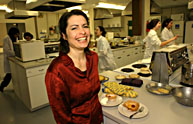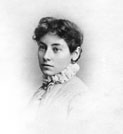In focus
Judy Campbell-Gordon: McGill's domestic goddess
Folding filo, whipping meringue and licking egg-beaters clean are not usual university classroom activities. But for Dietetics and Nutrition students the secrets of pastries and mysteries of preserves are part of their required ken.

Owen Egan
"How can they counsel people about their food choices if they don't know what goes into them?" asks Judy Campbell-Gordon, technical coordinator of Macdonald Campus's Southam food laboratory, casually known as their test kitchen. She oversees 10 to 13 labs a semester, the floury hands-on component of classes taught by Louise Thibault.
The labs usually have 20 students, divvied up into teams at the different kitchen stations replete with sinks, ovens and stoves. Judy monitors the students, who in the Friday afternoon class are from as far afield as Taiwan and Saudi Arabia. She's given them pie recipes from her grandmother's 1932 Five Roses Flour cookbook. "Pie is pie," she laughs. She also takes (and sometimes alters) recipes from more modern sources, such as Canadian Living and Homemaker magazines. First-year student Chih-Yun Cheng, from Taiwan, proudly shows us her quiche and some low-fat filo pastry tartlets with peaches and raspberries.
Before showing them the cooking ropes, Campbell-Gordon teaches the students about sensory evaluation — taste, colour and texture — and how these change with cooking.
The students experiment making crusts with white flour, whole wheat flour, milk, water, with fork pricks or not, with lard or without. Need a chemical reaction trick to make the crust tender? Vinegar diminishes the flour's gluten that can make pie tough. Need to make a gluten-free crust? She shows them how.
"I'm trying to expose them to as many ingredients as possible," Campbell-Gordon says. In the recent grains class, she showed them different kinds of rice, buckwheat, and wheat kernels. The students learn to prepare healthy foods, for instance, "how to marinate tofu and make it acceptable."
McGill's dietetics program includes an internship, so students get experience at hospitals and clinics, or by presenting information to schools. They must learn how to accommodate a wide range of dietary needs, for people with diabetes, gluten intolerance, heart disease or those who need to cut out fat or salt.
She also teaches the two-credit Quantity Food Preparation. Teams of five students prepare a business proposal, a budget and develop a theme menu for a 50-person ticketed event in the spring. First they prepare 25 meals' worth, which they sell to students, before tackling the big evening. Diners fill out a questionnaire, rating the food, atmosphere and experience, but marks primarily go toward kitchen procedure following Hazard Analysis Critical Control Point (HACCP) guidelines. "We had a hamburger scandal once," Campbell-Gordon said of the '50s Diner theme night that she was assistant teacher to. After the students checked the HACCP flow chart, they realized they'd improperly handled the meat before cooking. Half wanted to serve up the patties anyway, the others didn't. In the end, the professor rushed out to buy 50 kg of hamburger to cook up all over again, while the students taught dancing to the crowd to delay supper. Their marks weren't high.
Campbell-Gordon keeps the test kitchen supplied, and is careful about costs. She uses readily available ingredients — "It makes lab experience a real thing," she says. Those who seek a dietician's advice shop at supermarkets and are home cooks, not necessarily haute chefs seeking out avant-garde goods. Campbell-Gordon also gets donations from companies, such as frozen fruits and vegetables from Arctic Gardens, and margarine and oil from Becel. Fleischmann's promotes yeast awareness by sponsoring a bread-making contest for second-year students. With low-carb diets in vogue, doughy pursuits are on the wane, and Fleischmann's hopes to boost bread in the public eye. They've donated bread machines, jolly yellow oven mitts, cookbooks, breadknives and coasters. (Go to www.breadworldcanada.com to see the contest results.)
During the summer, she cultivated a sourdough starter so that students could bake loaves of sourdough bread. "I'm constantly looking for something new," she says. She also takes time each year to rewrite the hefty lab manual (which dated from the '80s, if not earlier, when she started nearly six years ago).
Year-round, she analyzes the nutritional breakdown of recipes for The Gazette's food section, as well as developing healthy recipes of her own that she hopes some day to publish.
As a girl in Dalesville, Quebec, (north of Lachute) Campbell-Gordon learned how to cook, knit, sew and garden from her crafty French-Canadian mum, herself one of six kids. After degrees in physiology and dietetics, she worked at the Montreal General Hospital for four years before the opening at McGill made the jump from the cutback-ridden hospital worthwhile.
She hasn't regretted the move at all, and loves interacting with the students. One recently told her, "If it wasn't for making pie here, I'd never have known how good it tastes." With more people than ever buying prepared food, few know what a homemade slice of pie tastes like, or the simple joy of making their own bread.
 |
||||
|
Solitude is not something we need to equate with loneliness. There are advantages to conducting our lives without feeling responsible for others." |
||||
Foundations
The importance of librarianship hardly needs explaining in these pages, but it wasn't always so. Especially in 1895, when Margaret Ridley Charlton (1858–1931) was appointed assistant librarian at the McGill Medical Library.

Assistant librarian Margaret Charlton
Charlton was recently recognized by the Government of Canada as a "person of national historic significance." There are only around 800 so honoured in this country.
Despite being responsible for organizing, systemizing and expanding the holdings of the medical library during her tenure from 1895 to 1914, Charlton never rose above the position of assistant librarian at McGill. In her day the librarian was a member of the faculty — in this case headed by Dr. F.G. Finley — who had the good sense to let her run things as she pleased.
And run them she did.
Librarianship wasn't the profession it is today. Charlton is likely the first librarian at McGill who had any professional training in her field, learning the Dewey decimal system at Amherst College in Massachusetts. There were few associations through which librarians could exchange knowledge. When the British and Canadian Medical Associations held a joint meeting in Montreal, she met Dr. William Osler. Recognizing the need for improved librarianship in medical faculties, Osler, Charlton and Philadelphia Medical Journal editor George Gould met to form the Association of Medical Librarians, now a major international association.
Charlton was a woman of prodigious abilities in a time when women had few outlets for their intellects. She wrote what may be Canada's first book of fairy tales for children, A Wonder Web of Stories with Caroline Fraser.
She also was an able historian, writing journal articles and monographs on historical topics like the practice of medicine in pre-conquest Quebec.
The assistant librarian was a prickly personality, and when Dr. Finley resigned as her supervisor, his successor did not see eye to eye with Charlton on the proper running of the library. She left McGill in 1914 under something of a cloud, but found employment at the Toronto Academy of Medicine as their medical librarian, where she remained until 1922.
A plaque to Charlton's memory will be installed in the medical library in the future.
 |
||||
|
It's probably one of the best examples of wild over-extrapolation in science I've ever seen. At the very least they should be chided for overactive imaginations." |
||||
